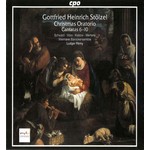
MARBECKS COLLECTABLE: Stölzel - Christmas Oratorio (Cantatas 6 - 10)
 $40.00
Low Stock
add to cart
$40.00
Low Stock
add to cart
GOTTFRIED HEINRICH STOLZEL
MARBECKS COLLECTABLE: Stölzel - Christmas Oratorio (Cantatas 6 - 10)
Britta Schwarz (Mezzo Soprano), Henning Voss (Alto) Jan Kobow (tenor) Klaus Mertens (bass) / Weimarer Barockensemble, Ludger Rémy
[ CPO / CD ]
Release Date: Friday 1 March 2002
Should this item be out of stock at the time of your order, we would expect to be able to supply it to you within 2 - 5 business days.
Recorded Weimar, Redoute, January, 2000
Stölzel was born in Grünstädtel, in the Erzgebirge, on 13 January 1690. His father, organist in Grünstädtel, gave him his first music education. When he was thirteen, he was sent to study in Schneeberg, where he was taught music, including thoroughbass, by cantor Christian Umlaufft, a former student of Johann Kuhnau. A few years later he was admitted to the gymnasium in Gera, where he further practiced music under Emanuel Kegel, the director of the court chapel. Some of his educators took a dim view of music, and tried to divert his attention from it: apart from engaging in poetry and oratory, Stölzel nonetheless continued to develop his interest in music.
In 1707 he became a student of theology in Leipzig. The city had a lot to offer from a musical point of view: its opera had been reopened shortly before, which Stölzel liked to visit. He became acquainted with Melchior Hoffmann, at the time music director of the Neukirche and conductor of the Collegium Musicum, both in succession of Georg Philipp Telemann, who had left Leipzig in 1705. Perfecting his art under Hoffmann, Stölzel also acted as his copyist, and started composing: initially Hoffmann performed these compositions as his own, Stölzel gradually coming to the open as their composer. (Wiki)
Tracks:
Das Alte is vergangen
Das Ende eines Dinges ist besser denn sein Anfang
Alles, was ihr tut mit Worten oder Werken
Danksaget dem Vater
Stölzel: Wir haben ein festes prophetisches Wort